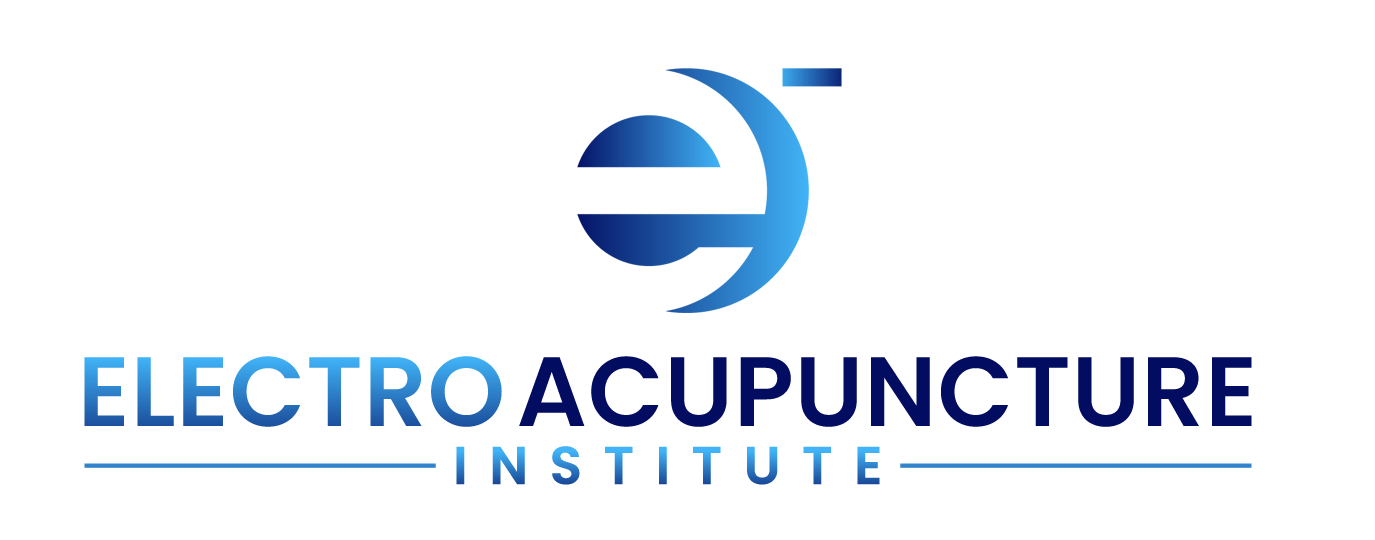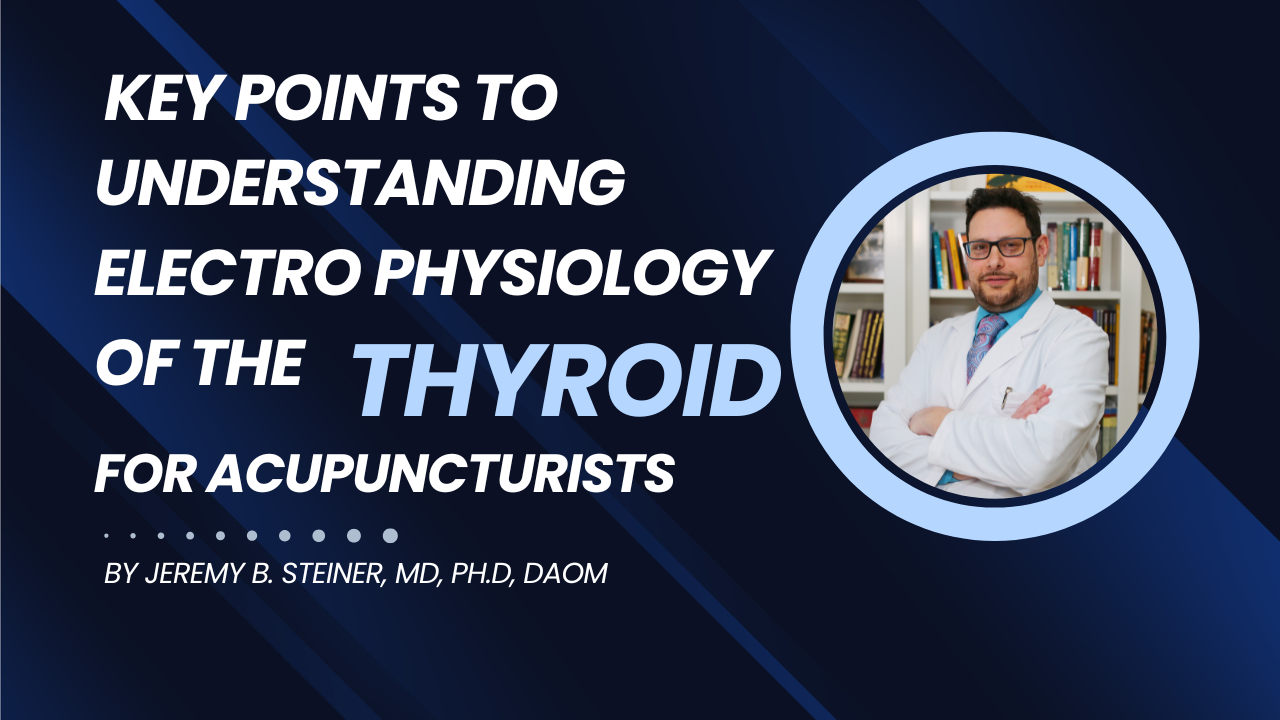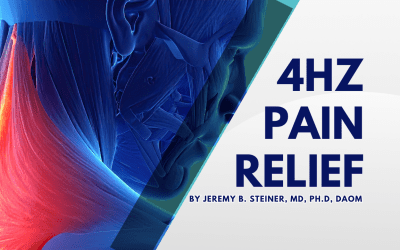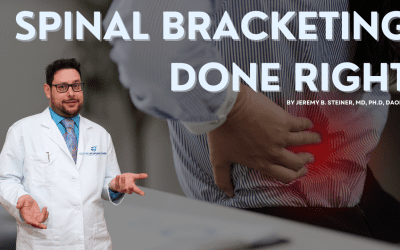Thyroid Power – Key Insights for Acupuncturists
Why the Thyroid Gland Matters in Acupuncture and Holistic Health
Be sure to check out this short video from one of my recent workshops, where I break down the essential role of the thyroid in regulating body temperature and voltage. You’ll discover how acupuncturists can use natural strategies and targeted treatments to support thyroid function, identify signs of dysfunction, and boost overall patient health.
Ready to enhance your approach to thyroid care? Let’s dive in!
For acupuncturists, understanding the thyroid gland is crucial. This small but powerful gland regulates 40% of body temperature and controls 60% of total body voltage—both of which significantly impact a patient's health. When body temperature fluctuates by even a fraction of a degree, over 100 enzymatic processes can slow down, disrupting metabolic balance. Similarly, maintaining adequate voltage is essential for the energy flow in every channel, contributing to cellular repair and regeneration.
Many patients face thyroid health issues, yet traditional approaches often overlook the underlying causes and symptoms. From iodine deficiency to exposure to fluoride and bromide, the thyroid is subject to various stressors. This guide explores thyroid dysfunction, natural treatments, and nutritional support, enabling acupuncturists to better support patients with thyroid issues.
The Role of Iodine and Thyroid Function
The mineral iodine is essential for producing thyroid hormones that regulate the body’s metabolism and energy. Without adequate iodine, the thyroid cannot function properly. Over the years, iodine deficiency has become increasingly common in the U.S., with significant consequences for thyroid health, such as hypothyroidism and goiter. Iodine has been removed from many foods and often replaced with bromide, a substance that competes with iodine uptake and can lead to a fake thyroid hormone. This counterfeit hormone often goes undetected in standard blood tests and can cause misdiagnoses.
For patients with thyroid issues, iodine supplementation can be transformative. It is beneficial not only for hypothyroidism but also for hyperthyroidism and Hashimoto’s disease, where iodine, used with cofactors like selenium, can support thyroid function safely. Patients with Graves disease, an autoimmune thyroid disorder, may also find iodine useful, although they should use it under medical supervision due to the condition’s complexities.
Recognizing Symptoms of Hypothyroidism and Making a Diagnosis
Symptoms of hypothyroidism often include fatigue, weight gain, depression, cold intolerance, and dry skin. Many patients live with these symptoms, unaware of the connection to their thyroid health. One diagnostic tool acupuncturists can use is the acugraph, which assesses channel energy flow. If a patient's channels show low energy across the board, this may indicate a thyroid issue or a gallbladder channel imbalance.
Traditional TSH testing alone can miss underlying thyroid dysfunction. For a comprehensive thyroid assessment, acupuncturists and functional medicine practitioners should consider additional tests, including T3, T4, and reverse T3. These levels provide a fuller picture, helping to determine if the thyroid is under- or over-functioning, and informing a more personalized treatment approach.
Natural Treatments: Desiccated Thyroid vs. Synthetic Medications
For treating hypothyroidism, natural desiccated thyroid is often more effective than synthetic options like levothyroxine. Desiccated thyroid provides a full spectrum of thyroid hormones that more closely resemble the body’s natural hormone balance. Synthetic thyroid medications, in contrast, typically contain only limited hormones, which may not address the whole spectrum of patient symptoms. Additionally, synthetic medications often contain GMO components, raising concerns among patients seeking holistic treatments.
Acupuncturists may also wonder if iodine is safe for patients with hyperthyroidism or Hashimoto’s disease. The answer is yes, but with caution. Iodine deficiency can contribute to both conditions, so providing it—along with selenium, a necessary cofactor—can help prevent over-stimulation of the thyroid. Patients with Hashimoto’s disease often respond well to this balanced approach, as selenium helps regulate iodine metabolism, reducing the risk of exacerbating thyroid issues.
Supporting Autoimmune Thyroid Disorders with Vitamin D
Vitamin D is a vital nutrient for immune function and is essential for maintaining cellular membranes and supporting thyroid regeneration. Patients with autoimmune thyroid disorders, such as Hashimoto’s disease and Graves disease, may benefit from vitamin D supplementation. A deficiency in vitamin D can worsen autoimmune activity, making it a valuable addition to a thyroid-support protocol.
For patients new to vitamin D, a starting dose of 30,000 IU per day for the first month can be helpful, then reducing to 1,000 IU daily. For long-term maintenance, some practitioners recommend 5,000 IU daily. Testing vitamin D levels through blood work is an effective way to ensure patients maintain optimal levels, generally aiming for above 90. In regions with lower sunlight, such as Alaska or parts of northern Europe, dietary sources of vitamin D, like fatty fish, can support these levels naturally.
Environmental Toxins and Their Impact on the Thyroid
The thyroid is particularly vulnerable to environmental toxins such as fluoride, bromide, and chlorine. These chemicals interfere with iodine uptake, creating synthetic thyroid hormones that may appear normal on standard blood tests but are ineffective in regulating thyroid function. Fluoride impact on thyroid health is significant, as it displaces iodine, leading to hypothyroid-like symptoms.
Additionally, the thyroid is sensitive to electromagnetic frequencies (EMFs), which can disrupt cellular communication and interfere with metabolic balance. By reducing EMF exposure and encouraging patients to drink filtered or distilled water free from these chemicals, acupuncturists can support their thyroid health. Adding four essential salts—sodium bicarb, calcium, magnesium, and potassium—to distilled water helps replenish minerals that are lost during filtration, supporting the thyroid and overall well-being.
Beyond TSH Testing: Comprehensive Blood Work for Thyroid Health
Many practitioners rely solely on TSH testing for thyroid diagnosis, but this approach can miss deeper thyroid imbalances. A comprehensive thyroid panel should include T3, T4, reverse T3, and thyroid antibodies. This in-depth testing provides more insights, allowing acupuncturists to offer targeted, patient-specific treatments.
Although these tests may not always be covered by insurance, they are a worthwhile investment in understanding the full picture of a patient’s thyroid health. Acupuncturists can encourage patients to pursue these tests or explore alternatives like acugraph readings, which provide a broader view of channel imbalances often tied to thyroid dysfunction.
Diet and Lifestyle Changes for Thyroid Health
Diet plays a significant role in thyroid health. Research links gluten consumption to autoimmune thyroid disorders, making a gluten-free diet a helpful recommendation for patients with Hashimoto’s or Graves disease. Though it remains unclear whether gluten itself or related toxins are the cause, removing gluten can often alleviate symptoms of autoimmune thyroid issues.
Patients should also be mindful of their water quality. Tap water often contains fluoride and chlorine, which can affect the thyroid. Encourage patients to use filtered or distilled water, which removes harmful substances. Distilled water combined with four essential salts (sodium bicarb, calcium, magnesium, and potassium) is a practical choice, ensuring hydration without adding chemicals that stress the thyroid.
Conclusion: Holistic Approaches to Thyroid Health in Acupuncture
The thyroid gland plays a foundational role in regulating body temperature and voltage, directly impacting energy levels, mood, and metabolic function. For acupuncturists, supporting thyroid health holistically can offer substantial benefits to patients, especially those dealing with hypothyroidism, hyperthyroidism, or autoimmune thyroid disorders.
By addressing iodine deficiency, incorporating vitamin D, and using natural desiccated thyroid, acupuncturists can provide a more balanced approach to managing thyroid health. Reducing environmental toxins, EMF exposure, and promoting a gluten-free diet can also have a positive effect, enabling the thyroid to function optimally.
Understanding thyroid health and using acupuncture to support the endocrine system enables acupuncturists to offer patients a holistic pathway to recovery, balancing both physical and energetic aspects for overall well-being. By working with patients to assess and address these foundational health issues, acupuncturists can help restore balance to the thyroid and, in turn, improve their quality of life.
Conclusion: Empower Thyroid Health Through Acupuncture and Holistic Support
The thyroid isn’t just another gland—it’s a vital regulator of body temperature, energy, and voltage across the body. Supporting thyroid health can lead to improved patient outcomes, from enhanced energy levels to a balanced metabolism. By understanding the impact of iodine, vitamin D, and natural interventions, acupuncturists can provide targeted care for patients with thyroid concerns.
For more information on optimizing thyroid health through acupuncture and holistic treatments, visit our website ww.electroacupunctureinstitute.com and explore our free resources for practitioners.
Remember to download our guide, “Key Points To Understanding Electro Physiology Of The Thyroid For Acupuncturists”
Peace and Bliss,
Jeremy Steiner, PhD. MD, DAOM





